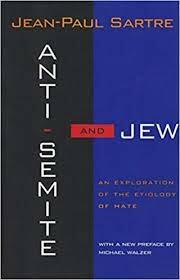Take a photo of a barcode or cover
challenging
dark
informative
reflective
fast-paced
Sartre's influence is broadly sweeping - a psychological social analysis of the anti-Semite and the Jew. In some ways he writes so strongly about the Jews that he seems to heighten the level of pity to be felt for the poor victim. His analysis seems to have some flaws yet sometimes he makes a noteworthy point. His idea that anti-Semitism would not exist in socialism as it does in democratic societies I find to be dubious, however my own analysis of "the anti-Semite" does coincide with his insofar as we are in agreement that the anti-Semitism originates in a sick and weak part of a person's soul.
"We are now in a position to understand the anti-Semite. He is a man who is afraid. Not of the Jews to be sure, but of himself, of his own consciousness, of his liberty, of his instincts, of his responsibilities, of solitariness, of change, of society, and of the world - of everything except the Jews. He is a coward who does not want to admit his cowardice to himself......The Jews only serves him as a pretext, elsewhere his counterpart will make use of the Negro or the man of yellow skin. Anti-Semitism, in short, is fear of the human condition....p. 54
The democrat is a "feeble protector" because he mainly wishes that the Jew will become part of a whole - an indistinguishable part of a whole. p.55
"What is there to say except that the socialist revolution is necessary to and sufficient for the suppression of the anti-Semites? It is for the Jews also that we shall make the revolution. P. 151
"This means that anti-Semitism is a mythical, bourgeoise representation of the class struggle, and it could not exist in a classless society." p. 149
"We are now in a position to understand the anti-Semite. He is a man who is afraid. Not of the Jews to be sure, but of himself, of his own consciousness, of his liberty, of his instincts, of his responsibilities, of solitariness, of change, of society, and of the world - of everything except the Jews. He is a coward who does not want to admit his cowardice to himself......The Jews only serves him as a pretext, elsewhere his counterpart will make use of the Negro or the man of yellow skin. Anti-Semitism, in short, is fear of the human condition....p. 54
The democrat is a "feeble protector" because he mainly wishes that the Jew will become part of a whole - an indistinguishable part of a whole. p.55
"What is there to say except that the socialist revolution is necessary to and sufficient for the suppression of the anti-Semites? It is for the Jews also that we shall make the revolution. P. 151
"This means that anti-Semitism is a mythical, bourgeoise representation of the class struggle, and it could not exist in a classless society." p. 149
"In order to awaken this passion, what is needed is not to appeal to the generosity of the Aryans - with even the best of them, that virtue is in eclipse. What must be done is to point out to each one that the fate of the Jews is his fate. Not one Frenchman will be free so long as the Jews do not enjoy the fullness of their rights. Not one Frenchman will be secure so long as a single Jew - in France or in the world at large - can fear for his life"
Replace Jew with Immigrant or Muslim or Transexual or whatever you'd like and repeat as needed. Still works, J-PS. Still works.
Replace Jew with Immigrant or Muslim or Transexual or whatever you'd like and repeat as needed. Still works, J-PS. Still works.
Marred somewhat in its conclusions by Sartre's Marxism, but the detailed observations he makes about the character of both antisemites and their opponents are still hugely timely and relevant.
I don't know how to feel, how does Sartre talk so eloquently about antisemitism and it's mechanisms and why they are harmful and then proceed to perpetuate it every time he talks about a Jew? It's like he didn't read the first half of his own essay? This book is the equivalent of academic whiplash. To be fair the preface warns you what Sartre is about to do (one of those stars is for the preface which is brilliant) but it's still awfully and deliciously ironic that Sartre himself becomes (unintentionally through his own ignorance) an anti-Semite.This essay is just one example of why sensitivity readers are important.
informative
medium-paced
First and last part are great. Middle is long and... well it was written a long time ago...
Interesting blurbs and good counter arguments to those subsumed to the hatred of antisemitism. Definitely felt like it could have been much shorter of a book, however, it was worth the read. I enjoyed his holistic view of the individual and their attributes, and also noticed that his approach seems to be misappropriated by some individuals.
inspiring
reflective
medium-paced
So many poignant observations that still remain very true today, I would never ever expect a white man in the 1940s to be able to discuss the racial other this lucidly. The only reason I didn't give this a 5 is that I feel like it in the end reduced racism too much down to its psychological dimension. It's true that Sartre describes the subjective experiences of the antisemitism extremely well, and I understand that he wants to remove all of the excuses for choosing to be racist, but I still think it lacks perspective on the material structures of raising antisemites.
Sartre brings up a lot of really great points about the nature of the Anti-Semite and how his passion, his identity, is very much dependent on the existence of the thing he hates most: the Jew. I would have rated this book 5/5 stars for the fact that it is well-written and incredibly strong in most places, easier to understand and articulate than some of Sartre's other work. However, he makes some claims that seem to have no evidence backing them up, like the restriction of Anti-Semitism to the bourgeoisie. Therefore, this book gets a 4.


